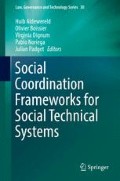Abstract
Currently, software engineering of complex systems regards systems as a collection of systems, composed of technical and social (humans and/or organisations) components. Such systems are characterised by an entanglement of human, software and organisational interactions. More than an integration of technical and social components, the design and analysis of such socio-technical systems must deal with the social coordination of these components. Social coordination refers to the mechanisms and processes mediating the contingent bonds between the individual components, and which are subject to evolution. This requires the technical components of socio-technical systems, to be socio-cognitive technical systems (SCTS), which poses several design challenges. In particular, the design of SCTS must incorporate organisational, normative, cultural and other social elements into the technological design. In recent year, several frameworks have been developed to deal with the design of SCTS, from different perspectives and geared to different areas of application. This book presents a comprehensive overview of these frameworks, provides a thorough comparison of the models and tools that support them, and discusses possible areas of application and the associated challenges.
Access this chapter
Tax calculation will be finalised at checkout
Purchases are for personal use only
References
Castelfranchi, C. 1998. Modelling social action for AI agents. Artificial Intelligence 103(12): 157–182. doi:http://dx.doi.org/10.1016/S0004-3702(98)00056-3, http://www.sciencedirect.com/science/article/pii/S0004370298000563. Artificial Intelligence 40 years later.
Coutinho, L., J. Sichman, and O. Boissier. 2009. Modelling dimensions for agent organizations. In Handbook of research on multi-agent systems: Semantics and dynamics of organizational models, ed. V. Dignum, 18–50. Hershey: Information Science Reference.
DeLaurentis, D., and R.K. Callaway. 2004. A system-of-systems perspective for public policy decisions. Review of Policy Research 21(6): 829–837. doi:10.1111/j.1541-1338.2004.00111.x, http://dx.doi.org/10.1111/j.1541-1338.2004.00111.x
Ferber, J., O. Gutknecht, and F. Michel. 2003. From agents to organizations: An organizational view of multi-agent systems. In AOSE: Agent-oriented software engineering IV, LNCS, vol. 2935, ed. P. Giorgini, J.P. Müller, and J. Odell. Berlin/New York: Springer.
Horling, B., and V. Lesser. 2004. A survey of multi-agent organizational paradigms. The Knowledge Engineering Review 19(4): 281–316.
Miles, S., M. Joy, and M. Luck. 2003. Towards a methodology for coordination mechanism selection in open systems. In Engineering societies in the agents’ world III, no. 2577 in lecture notes in artificial intelligence, ed. P. Petta, P. Tolksdorf, and F. Zambonelli. Berlin/New York: Springer.
Noriega, P., J. Padget, H. Verhagen, and M. d’Inverno. 2015. Towards a framework for socio-cognitive technical systems. In COIN X, no. 9372 in LNAI, ed. A. Ghose, N. Oren, P. Telang, and J. Thangarajah, 164–181.
So, Y., and E. Durfee. 1998. Designing organizations for computational agents. In Simulating organizations, ed. K. Carley, M. Pritula, and L. Gasser, 47–64.
Acknowledgements
The work presented in this book was initiated by the workshop on Models for Social Coordination, held in Veldhoven, The Netherlands, March 2–7, 2014. This workshop was made possible by support from the European Network for Social Intelligence, SINTELNET (FET Open Coordinated Action FP7-ICT-2009-C Project No. 286370).
Author information
Authors and Affiliations
Corresponding author
Editor information
Editors and Affiliations
Rights and permissions
Copyright information
© 2016 Springer International Publishing Switzerland
About this chapter
Cite this chapter
Aldewereld, H., Boissier, O., Dignum, V., Noriega, P., Padget, J. (2016). Introduction. In: Aldewereld, H., Boissier, O., Dignum, V., Noriega, P., Padget, J. (eds) Social Coordination Frameworks for Social Technical Systems. Law, Governance and Technology Series, vol 30. Springer, Cham. https://doi.org/10.1007/978-3-319-33570-4_1
Download citation
DOI: https://doi.org/10.1007/978-3-319-33570-4_1
Published:
Publisher Name: Springer, Cham
Print ISBN: 978-3-319-33568-1
Online ISBN: 978-3-319-33570-4
eBook Packages: Law and CriminologyLaw and Criminology (R0)

